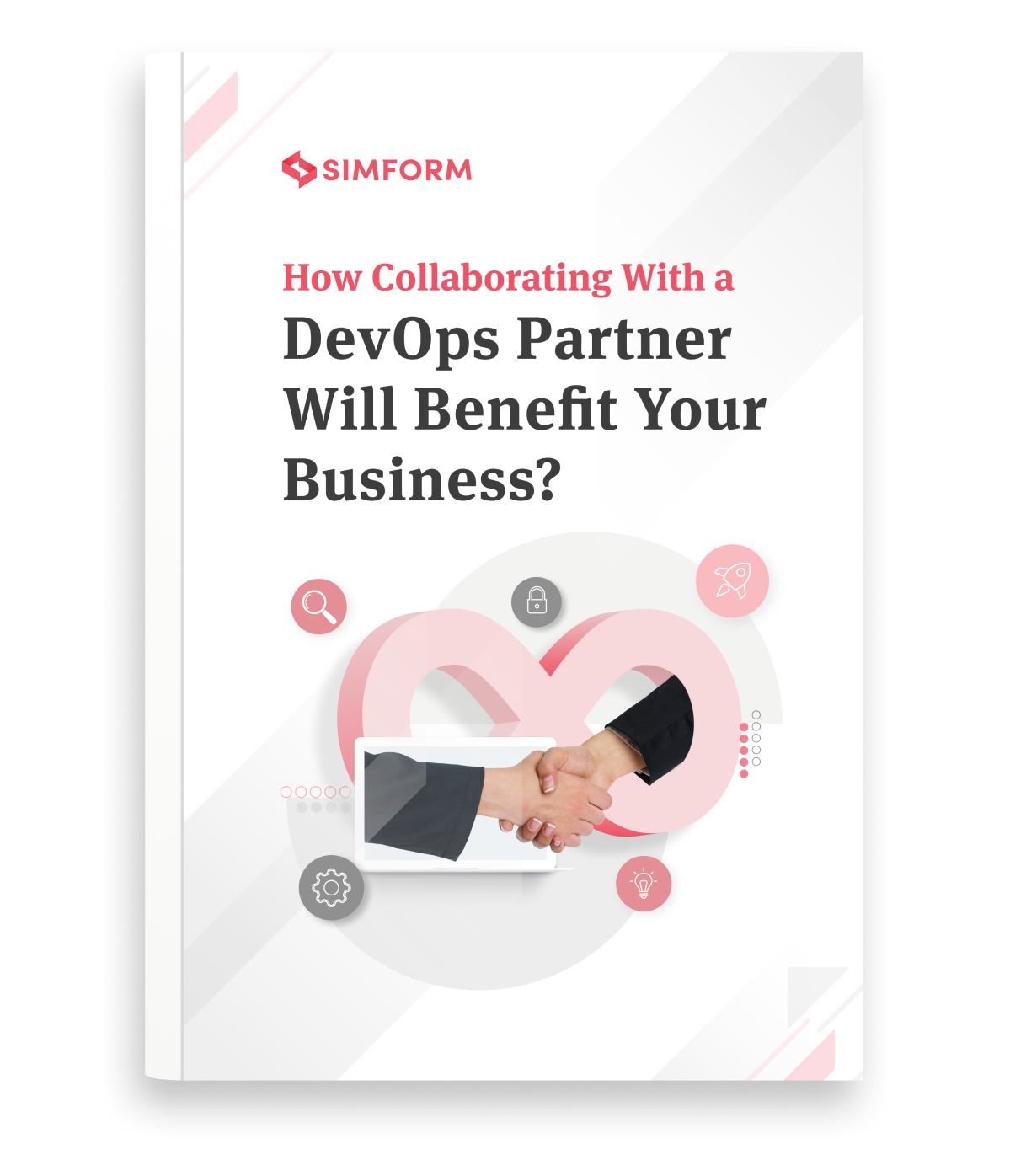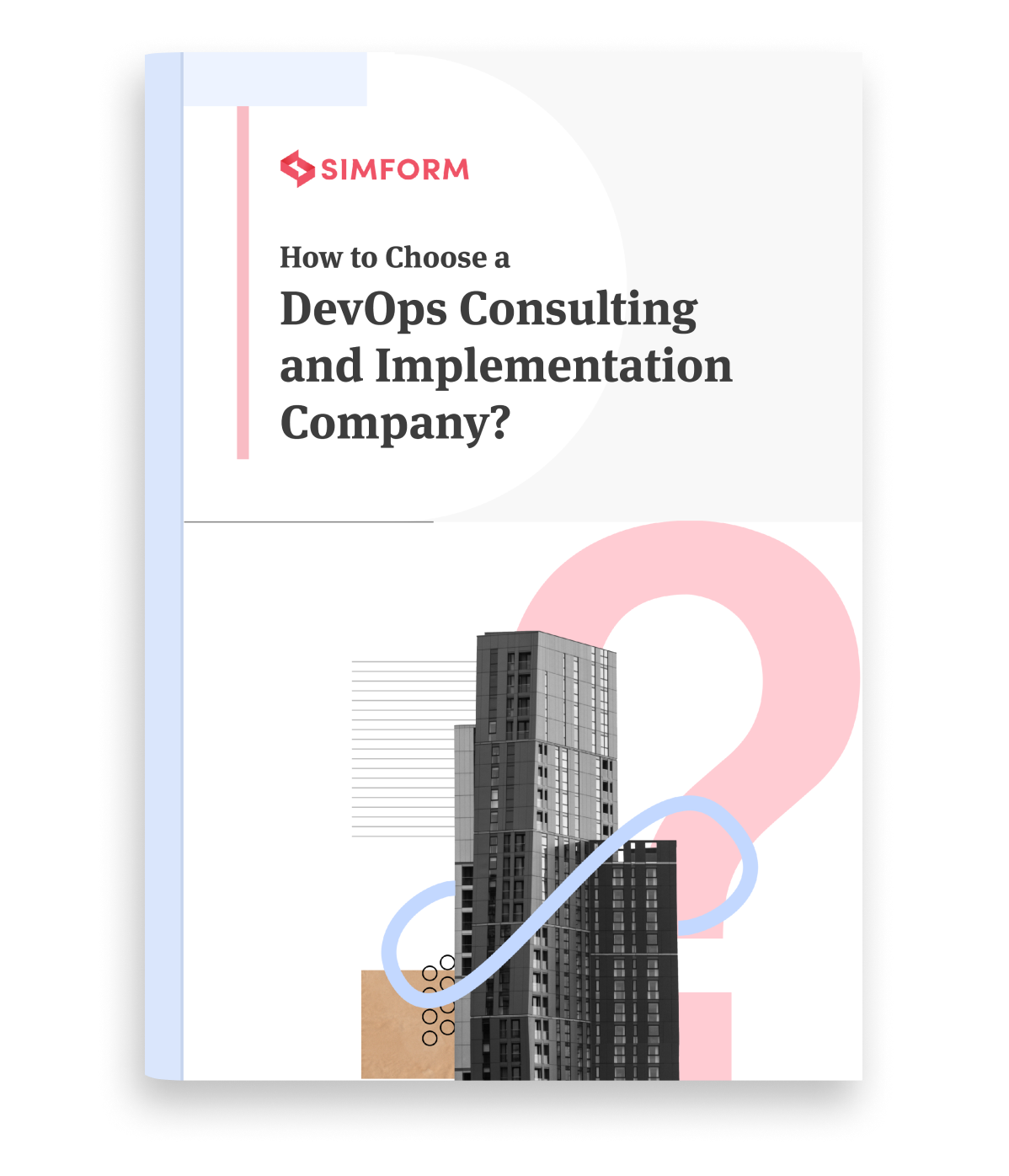Organizations struggle to implement DevOps. Enabling DevOps in-house is costly and requires experts with immense knowledge. According to the 2021 Upskilling report on DevOps, 47% of respondents experienced difficulty in the DevOps transformation journey. And the challenges spread equally across the people, organization, processes, and technology.
Another huge challenge was finding and attracting skilled individuals, as reported by 58% of the respondents. Moreover, 48% reported that the retention of qualified DevOps professionals is also a challenge. Have you encountered similar problems too?
An ideal way to deal with the above challenges is to outsource DevOps. In this blog, we will learn all about DevOps outsourcing, including its benefits and outsourcing models. The blog also discusses steps to get started with it, guidelines to make it work successfully, and choosing the right DevOps partner.
What is DevOps Outsourcing?
Often referred to as DevOps as a Service (DaaS), DevOps outsourcing is when a third-party service provider takes full responsibility for designing, building, and integrating DevOps solutions for your organization. The outsourcing partner forms a competent team that works side-by-side with your in-house software team and manages day-to-day operations.
Moreover, the provider helps implement other DevOps principles and practices into your organization in line with your business goals. It can include building automation in the DevOps environment, continuous monitoring, testing, etc.
If implemented correctly, DevOps outsourcing can empower organizations with immediate access to highly skilled resources with DevOps tools and expertise while avoiding the trouble and cost of building in-house DevOps teams. But how does it work?
How does DevOps outsourcing work?
DevOps is a software development approach focusing on culture and practices that make development and operations teams work like a singular entity. It aims to enhance collaboration between the two departments to shorten the software development lifecycle (SDLC).
Therefore, there is no one way to outsource DevOps, and each unique project requires a personalized approach. The DevOps as a Service provider will talk through the scope of work for your project and agree on services on a case-to-case basis.
The vendor can partner with you and support your continuous development, integration, delivery pipelines, and testing in multiple ways. A few strategies to outsource DevOps are discussed below:
- Fully managed DevOps services:
It includes end-to-end DevOps services. Here, the outsourcing vendor works with your in-house team to build, test and deploy applications and infrastructure in the cloud in an automated and continuous manner. The DevOps experts help your organization set up processes from scratch (including the four continuous stages of DevOps workflow) and even implement DevOps methodology to fit into your existing infrastructure and users’ requirements.
- DevOps consulting:
Here, the DevOps experts assess your current processes, offer guidance to improve them, and help implement the necessary changes to achieve your business goals the DevOps way.
- Operations management:
You can choose only to outsource operations management to a DevOps outsourcing provider to enable your in-house teams to focus on higher-value aspects such as maturing DevOps practices, automation, and more.
- DevOps Automation:
You can outsource automation to a DevOps services provider with technical expertise and talent to fasten results and create a reliable automated testing environment.
- Dedicated DevOps engineers:
You can also hire dedicated DevOps engineers for a long-term project from the vendor.
To have a clearer idea, let’s take a look at what services you can outsource in DevOps as a Service. Standard nearshore or offshore outsourcing partners offer services involving several areas. The specifications can be tailored to the clients’ organizational goals, project needs, application structure, team topology, and budgets. At Simform, we offer the following DevOps services:
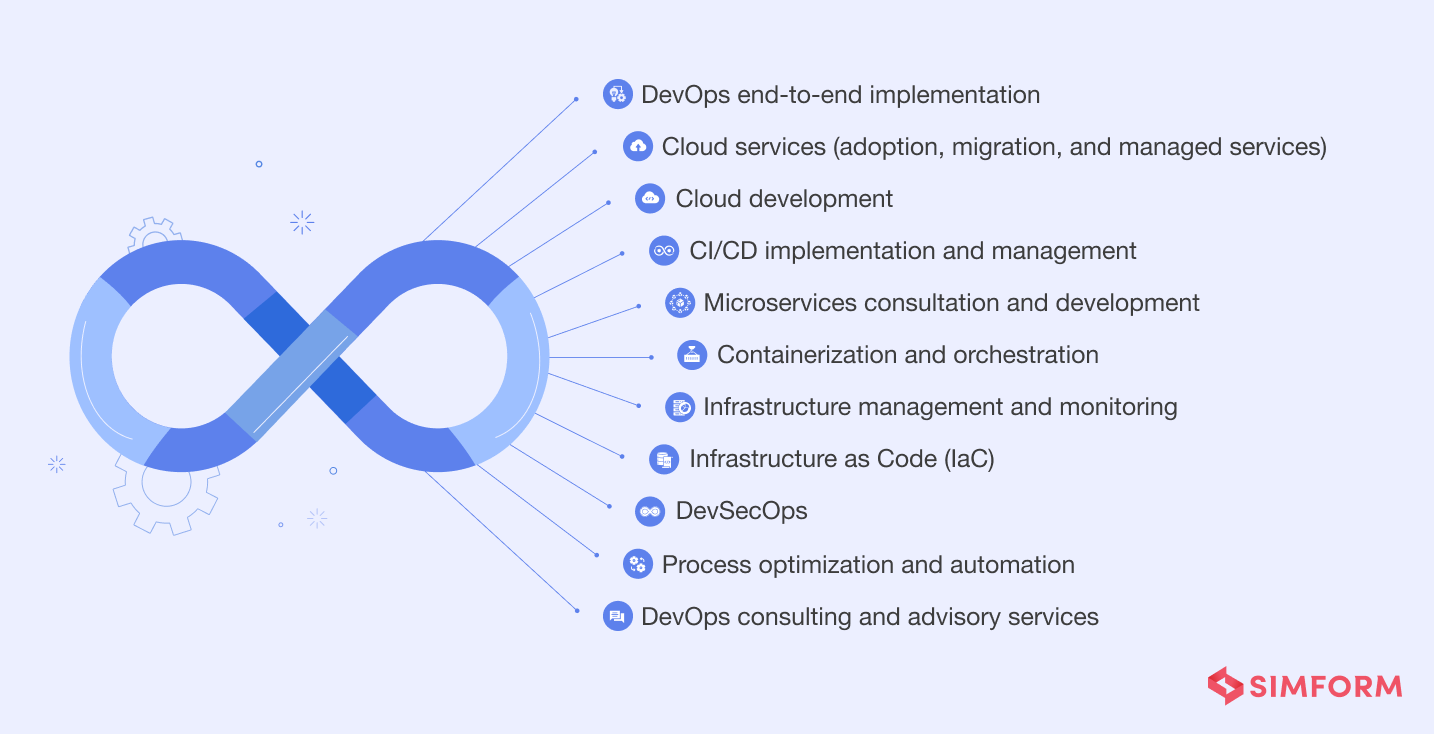
Today, DevOps has become a mainstream capability for agility. Yet organizations struggle to successfully optimize their product development, implement DevOps, and scale the services mentioned above.
The foremost reasons are shortage of DevOps talent, hiring costs, training expenses, and managing skills gaps. But outsourcing DevOps can address these issues, especially for startups looking to leverage DevOps and Agile for quick and secure development. Let’s discuss more such benefits of it below.
Should you outsource DevOps: Benefits of DevOps Outsourcing
When you outsource devops, you inherently gain all the DevOps benefits such as:
- Frequent deployments and deploying on-demand
- Shorter lead time to change
- Lower change failure rates
- Faster recovery times
- Decrease in outages and downtimes
- Faster time to market
- Reduction of waste
- Reduced development costs
For instance, we applied DevOps engineering principles to build a fully tested, scalable, quality website for FIH in just three months. Our DevOps team worked with FIH’s tech team to set up CI/CD pipelines, leading to faster releases, process efficiency, and added value to delivery quality. FIH also experienced cost savings and saved time on infrastructure maintenance by using AWS cloud and IaC. Overall, cloud migration, CI/CD, and automated testing significantly reduced the time-to-market.
Click here to read our full case study on FIH website development
But that’s not all! Outsourced DevOps also means you reap the benefits of outsourcing such as instant access to DevOps specialists, lower staffing costs, etc.
Intuitively, you may believe DevOps is best implemented in-house as it is highly integrated with operations and other business processes. But if handed off to the right DevOps company and implemented correctly, outsourcing DevOps brings multiple benefits as discussed below.
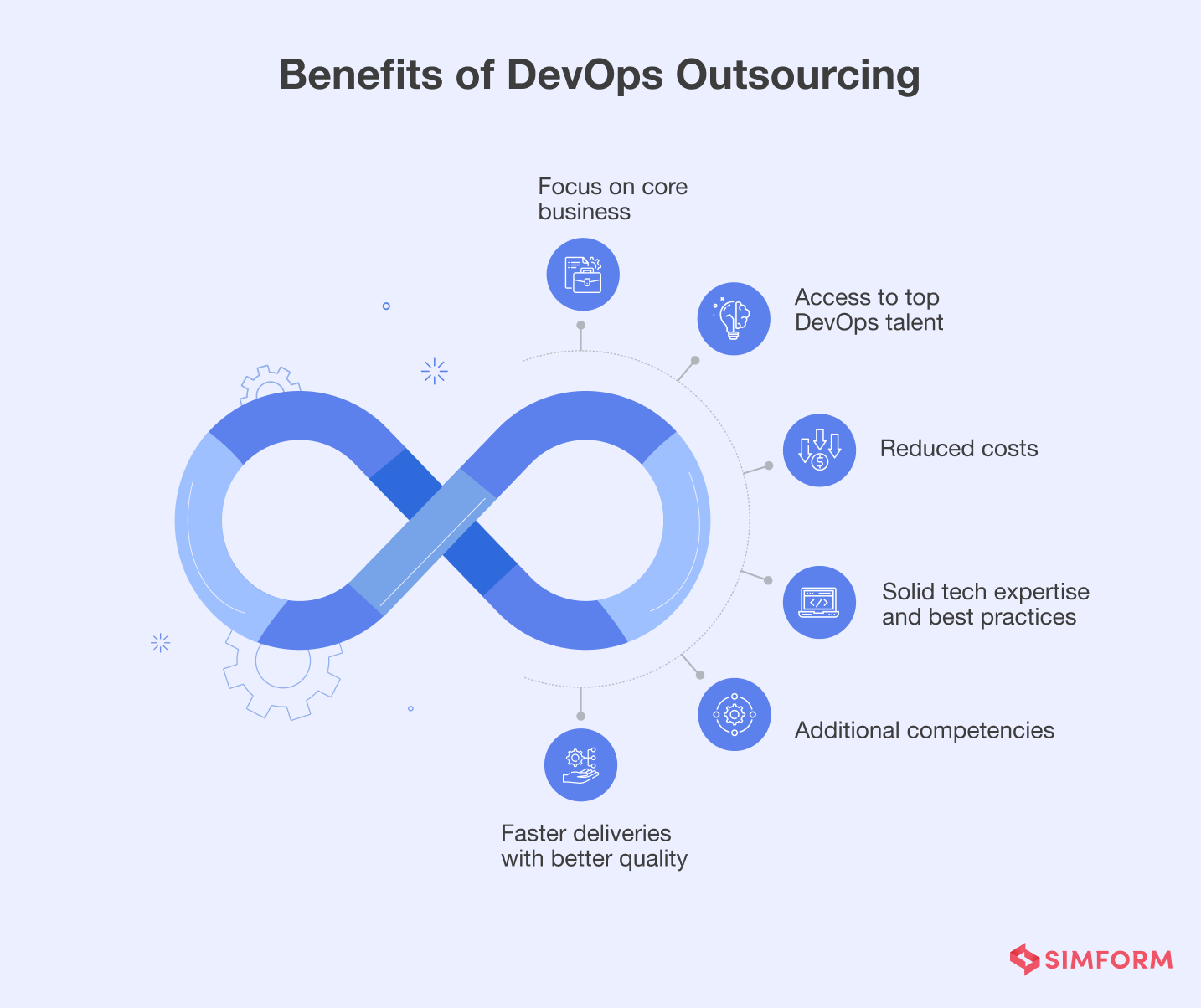
1. Focus on core business
When you outsource DevOps to a third-party vendor, you tap into a talent pool of DevOps experts while eliminating the burden of hiring and maintaining an in-house team. Moreover, the experts do all the heavy-lifting by utilizing DevOps and agile to enhance your software delivery and quality. And since they have specialized knowledge of the field, it saves time and costs less than creating equal capabilities internally in the long run.
2. Access to top DevOps talent
A shortage of DevOps talent and higher wages due to increasing demand are major reasons why businesses consider outsourcing DevOps. DevOps as a Service providers typically have a well-established vetting and recruitment process to provide clients with highly experienced or skilled talent. Moreover, you are not limited to the DevOps specialists at your location and can access a truly global talent pool.
3. Reduced costs
A significant advantage of outsourcing DevOps is easier and cost-efficient recruitment. You can forego the lengthy and expensive hiring process as outsourcing companies have experienced specialties with all the required certifications in one place.
There is also no need to spend time or money to train an internal team. Additionally, it eliminates certain financial risks such as no taxes, software licenses, office rent, etc. when you hire a remote team such as the outsourcing company incurs these themselves.
4. Solid tech expertise and best practices
Outsourcing companies have better expertise as they have tried and tested various approaches and solutions. They have worked on numerous projects that give them expertise in multiple domains.
In addition, outsourcing companies pay close attention to their staff’s technical skills and ensure they remain updated with the latest technologies with certifications and online courses.
5. Additional competencies
Another perk of outsourcing DevOps is gaining access to specialists such as database administrators, site reliability engineers, etc. If finding DevOps engineers is difficult as is, recruiting professionals with rare or niche competencies may be harder when gathering an in-house team. Thus, outsourcing provides additional skills where you can choose from a range of DevOps talent to distribute your tasks better and assign specialists to complex assignments.
6. Faster deliveries with better quality
DevOps as a Service companies have the DevOps culture rooted at the heart of their functions. Thus, outsourcing to the right vendor can shorten development cycles and enhance the software product quality. They improve the quality of production code and the end product with automation, continuous testing, constant monitoring, and continuous improvement.
DevOps outsourcing vs. In-house DevOps
For DevOps implementation, you usually face two choices- hiring an in-house team or outsourcing to a trusted DevOps service provider. While we discussed all the benefits of outsourcing DevOps, let’s look at the pros and cons of both to help you arrive at a better decision.
DevOps Outsourcing
| Pros | Cons |
|
-Access to top talent, technical expertise and additional competencies at reduced costs -Experience in working on various projects which provides domain expertise and ability to handle unforeseen situations or issues -Ease of scaling up or down of teams without additional administrative expenses and project management is also done at the vendor’s site -Lower risk of staff turnover due to a matured DevOps culture at the vendor company -Motivated teams focused on achieving results as defined by a binding contract/agreement -Value for money |
-Need for setting up proper communication mechanisms from scratch and maintaining good collaboration -Complex deployments can increase costs -Compromised application security of the vendor is inexperienced |
In-house DevOps
| Pros | Cons |
|
-Full internal control over each aspect of the project from development process to release -Use of tools of your choice without the necessity to adapt to the vendor’s toolset -Existing business knowledge -Settled communication and collaboration -Ability to control expenses |
-Shortage of local DevOps talent -Administrative costs such as office cost, benefits, perks -Lengthy and costly process of hiring and continuously training the teams -Limited expertise -Employee turnover or attrition issues -Need to build required infrastructure and process from ground up |
When not to outsource DevOps? Understandably, it may not be suitable for all situations. Thus, you must consider certain circumstances when outsourcing may cause potential drawbacks, such as:
- When you have access to full-time personnel and your infrastructure has grown larger to a size where you may need teams to own various parts of it
- When it is harder to integrate DevOps into your company culture
If your software architecture is an essential market differentiator and the delivery mechanisms are critical to your business
However, most projects today are fast-paced and prone to requirement changes due to the dynamic nature of user demands. Such projects can benefit from key features of outsourced DevOps. Moreover, it is also the best option for software teams that do not have the time or expertise to manage a complex application infrastructure along with rapid development. So, if you are planning to outsource DevOps, here is all you need to know to get started and make it work successfully.
Successful DevOps Outsourcing: How to get started and factors to consider
Outsourcing DevOps may differ from traditional outsourcing. There is no one-size-fits-all approach to it as DevOps is a broad and ambiguous concept. For effective DevOps outsourcing, below is a step-by-step approach to getting started with DevOps, choosing the right partner, and making it a success.
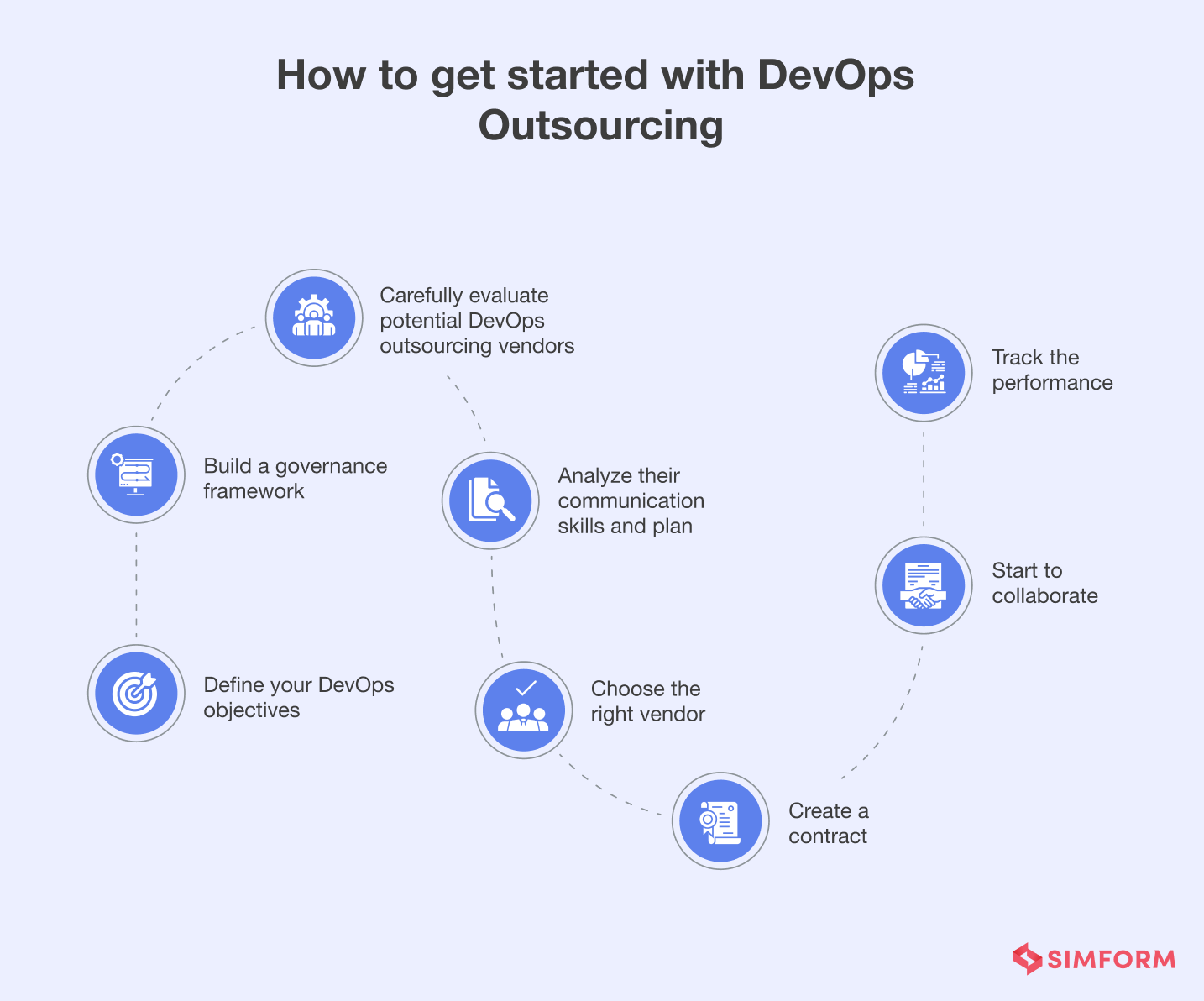
1. Define DevOps objectives
With DevOpsYe outsourcing, organizations are not only looking to cut costs but gain business benefits from agility and improved productivity. Therefore, it requires a cultural shift internally, which is driven by an external team. But your organization has multiple objectives to fulfill, apart from adopting a DevOps culture.
You can start by defining the goals you want to achieve and the problems you want to solve with DevOps. Identifying key areas for improvement will also help you choose the right DevOps company to meet your business-specific KPIs such as scalability, cost audit, 24/7 support, migration, big data, or data analytics.
Lay out your expectations clearly to avoid any unfortunate circumstances in the future and openly discuss deadlines, deliverables, etc. to be on the same page with the provider.
2. Build a governance framework
DevOps thrives on extensive collaboration, and thus, outsourcing it calls for a governance framework that outlines the important people involved, processes, and technologies. While the DevOps services provider brings in an external perspective of the business needs, the client knows the application, customer persona, and end objectives. So together, both can form a successful collaboration through using TOM (Targeted operating Model) to help mitigate differences and build teams with a single mindset.
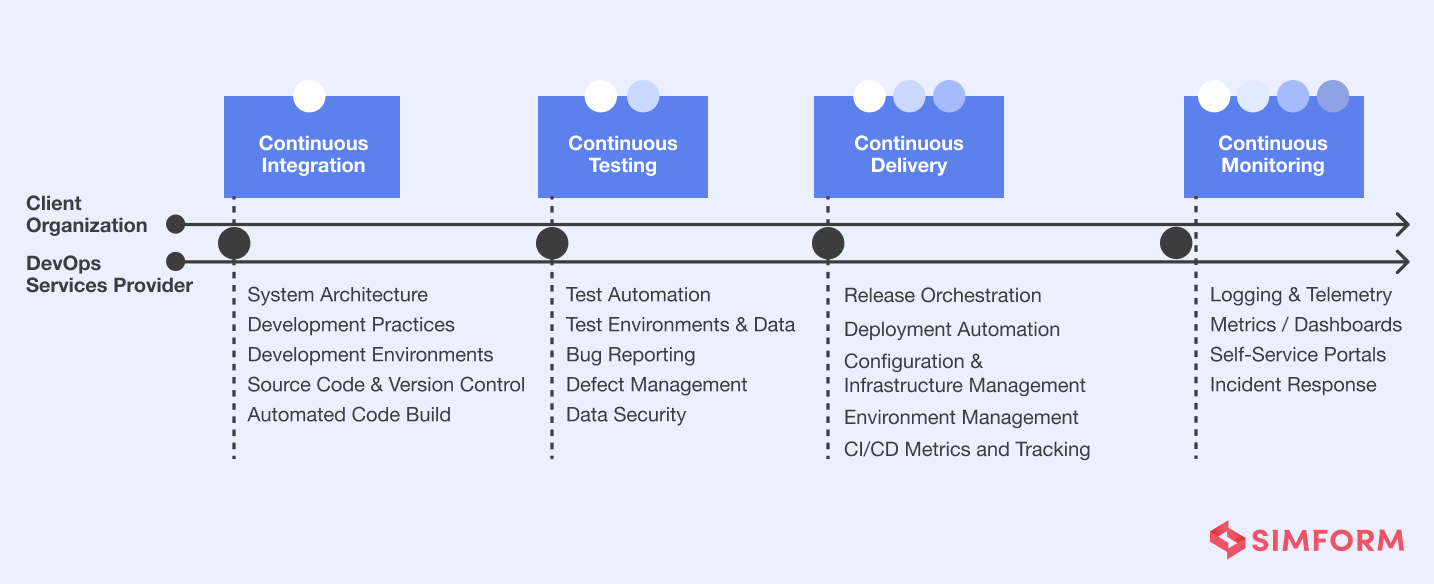
You can use TOM for applying a governance framework by using inter-related aspects such as functions, tooling, capabilities, people, processes, organizational structure, roles and responsibilities, and reviews. Further, you can pick the best bits for governance and integrate them into the model for better outcomes from outsourcing DevOps.
3. Carefully evaluate DevOps outsourcing vendors
Successful outsourcing significantly depends on choosing the right outsourcing partner. And organizations need to do rigorous research for the same. Consider the below checklist to conduct in-depth research for the list of your potential outsourcing partners. We have discussed it in detail in our ebook on how to choose the right DevOps consulting and implementation company.
- Conduct thorough background research
- Verify the technical expertise
- Ask for referrals
- Analyze reviews and testimonials
- View case studies
- Inspect industry verticals of their services
- Find certifications and recognitions
- Analyze their digital footprints
4. Analyze the communication skills and plan
Communication is the key to any successful outsourcing, and the same applies to DevOps. You must ensure that your DevOps partner has good communication skills and an efficient communication plan in place. You can gauge their skills by communicating with them through various channels and checking how professional they are. For an accurate decision, consider answering the following questions:
- How does the vendor respond to due diligence questions?
- Are they prompt and timely in their interactions?
- How open are they to your suggestions?
- Can you use the tracking software properly on your site?
- How will they respond to your request and the time taken to handle them?
- What tools will be used to plan and manage tasks?
- Have any previous clients of the vendor faced problems with communication and interaction?
Once you finalize a vendor, develop a communication plan with them detailing work, deadlines, responsibilities of both parties, and how requirement changes or improvements will take place.
5. Create a contract
Once you have finalized a vendor; it is time to make the partnership official with a contract. It comes down to the collaboration and pricing models as a DevOps company may offer various options. To help you choose the right one, we have discussed the DevOps outsourcing models in detail in the next section.
However, DevOps, in combination with agile development, does not come with a fixed scope. It uses a different approach to the scoping process in outsourcing, including how we approach contracting and collaboration models. Thus, the most significant impact has been a shift from closed-scope contracting to open-scope contacting.
- Closed-scope contracting
It considers functional and technical designs, result-oriented services descriptions, tools, and responsibilities. It is based on (more or less) static situations and controlled work methods.
- Open-scope outsourcing
It is where innovation, operations, and culture forms a part of the contract. It considers a stream of value generation, delivery, and management that align with continually changing market/user needs.
You can also consider a T&M (Time and Material) contract instead of fixed-price contracts, considering the dynamic nature of software engineering with DevOps, ever-changing requirements, cultural change, etc. To sum up, frame a value-driven outsourcing arrangement with the vendor that outlines the DevOps roadmap with necessary room for modifications and dynamicity in the long run.
6. DevOps performance tracking
Successful DevOps outsourcing does not end with finalizing a contract. It is essential that your DevOps partner understand the right metrics for your business to measure the performance and adhere to them.
Consider metrics that actually matter, such as deployment frequency, lead time for changes, mean time to recover, change failure rate, and more. These metrics will improve if your outsourcing arrangement is working right and you can easily quantify its success.
DevOps outsourcing models
Once you finalize a vendor you want to outsource DevOps to, it is essential to identify and choose a collaboration model based on your requirements. Let’s discuss the various models you can opt for while outsourcing DevOps:
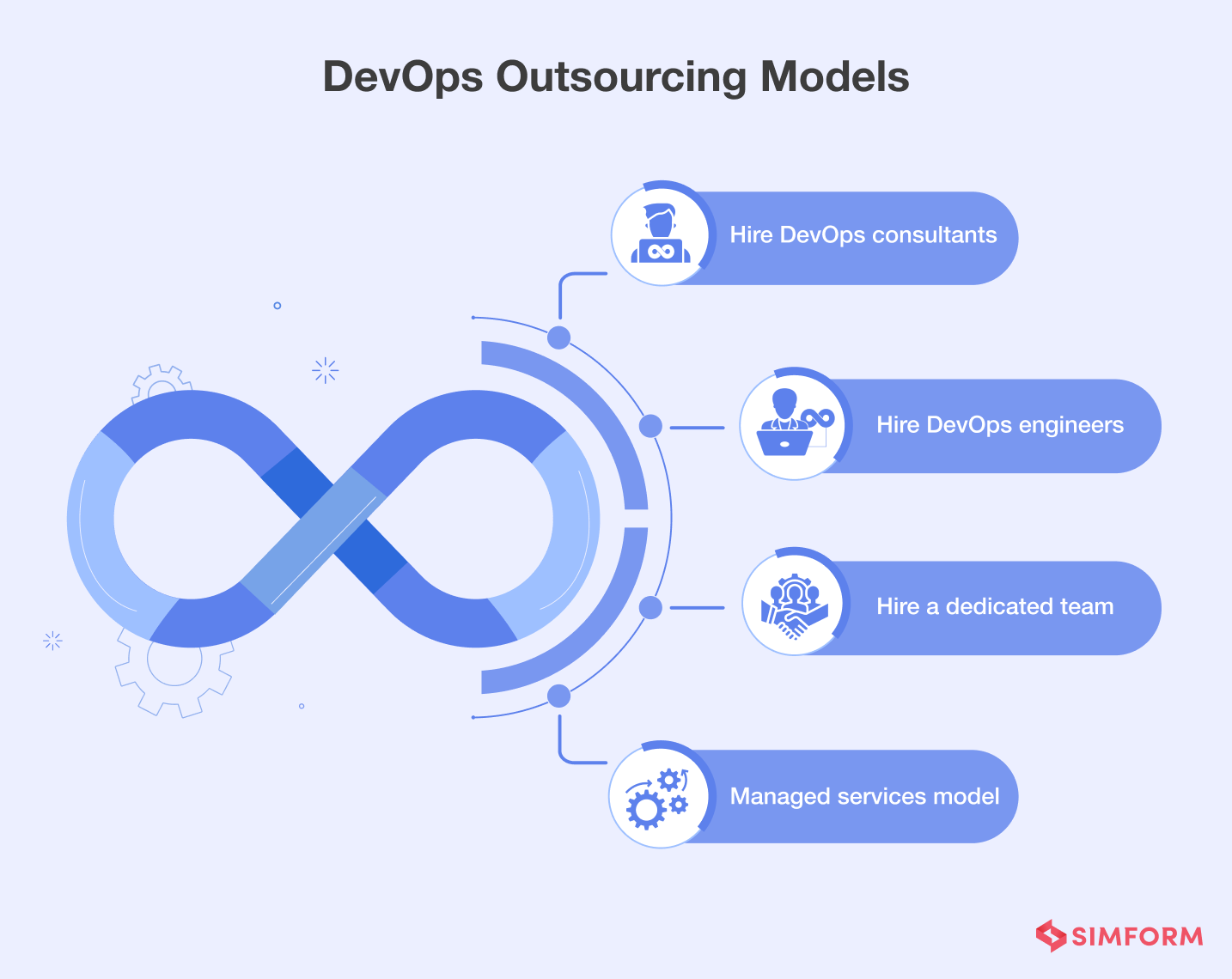
- Hire DevOps consultants:
You can hire one or more DevOps consultants to help you lay out a plan for DevOps implementation. Consultants provide services for a short period to perform specific tasks, including analyzing current ecosystems and optimizing strategies.
- Hire DevOps engineers:
If you’re looking to augment your team, you can hire one or more DevOps engineers from the services provider. Here, you have a say in the tools, technology, processes, and capabilities.
- Hire a dedicated team:
You can also hire a dedicated DevOps team that works exclusively on your project. You can build a team of engineers of any expertise or seniority that brings in innovative ideas and help form a long-term relationship.
- Managed services model:
In a managed services engagement model, the DevOps service provider proposes and manages the end-to-end implementation of DevOps for your organization.
Kickstart your Devops journey with Simform
Successful DevOps outsourcing depends on choosing the right partner with the right expertise. So if you are looking for an experienced DevOps service provider, Simfom can be your ideal technology partner. We combine innovation with our deep business understanding gained from working on DevOps projects in various industries. With years of experience and sound technical knowledge of DevOps, we can help you streamline your development and operational capabilities to accelerate the SDLC and quicken releases.
Moreover, our DevOps team has certified professionals who understand your needs and suggest solutions that fit your company culture. And we also extend our technical capabilities through strategic partnerships with market leaders like AWS and Microsoft. Contact us today to avail our full spectrum of DevOps services or to get a free consultation!
